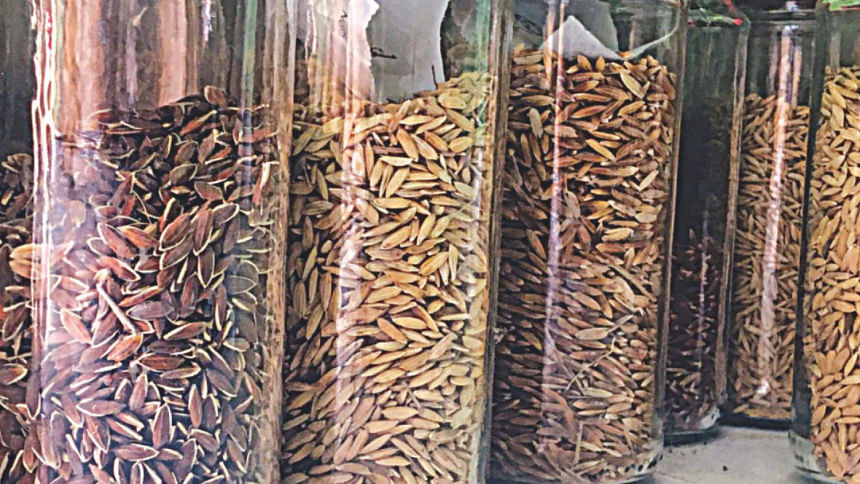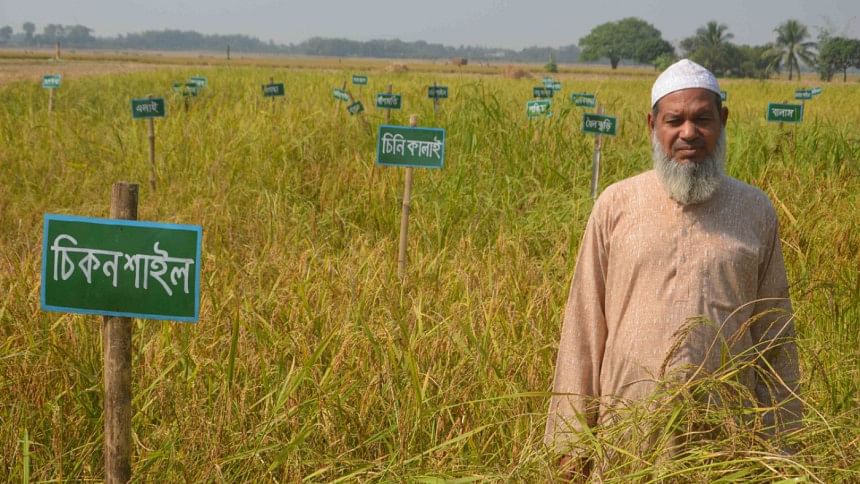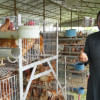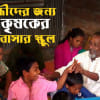He acts before they are lost

Seeing Yusuf Molla's collection of paddies, one is likely to reminisce about the famous verses of Jogindranath's poem “Kajer Chhele”: “Dadkhani chal, mosurir dal, chini-pata doi...”
Yusuf, a farmer in Rajshahi's Tanore, has at least 200 rare and almost extinct varieties of paddy in his collection that he has developed over the years out of love for the crop.
During a visit last month, this correspondent found 77 sections in Yusuf's land. Each section was signified with signboards carrying the names of the varieties cultivated there.
The varieties have distinct texture, colour, smell, and taste.
Yusuf said “Dadkhani” rice was rich in zinc. In the past, Bangalees used to serve it as a wholesome meal to the ailing.
“Raida” is slightly thin rice and the “mother of all paddies,” according to Yusuf.
The “Black Pankhiraj” has white parts on both sides and looks like a bird. Two grains grow from one seed of “Boiram Shundori”, also known as “Dui Shotin”. “Randhuni Pagol” has an enchanting scent.
“Kajaldigha”, “Laxmidigha”, and “Kalarai” can survive floods, while “Bhadoi”, “Kaloshoni”, “Kumri”, and “Shankhaboti” are resistant to droughts.
Yusuf and the farmers employed by him cultivated at least 150 varieties in 15 districts of Rajshahi division this year.
With yields from 82 varieties, Yusuf celebrated Nabanna Utsav (the festival of new crop) on December 9. On the occasion, around 200 guests including farmers were served with traditional recipes made of the rare varieties.
“I love the varieties. So, I feel the need to preserve them before they are lost,” Yusuf said. He collected the seeds from different corners of the country.

The 74-year-old farmer has one bigha of land in Duboil village where he has been cultivating the paddies for the last 50 years.
Shahidul Islam, regional coordinator of Bangladesh Resource Centre for Indigenous Knowledge (Barcik) lauded Yusuf for his passion.
“Preserving the varieties is important as paddy cultivation is losing momentum due to climate change. Yusuf did what the government ought to have done,” he said.
Yusuf inherited his passion for paddies from his father Abdur Rahman Malakar who produced different varieties every year and entertained villagers with the yields during Nabanna.
In 1968, the year Yusuf got married, he noticed that farmers were leaning towards IRRI-8 variety instead of local varieties.
“I feared that one day the local varieties might just vanish.” He started his search for the nearly extinct varieties in 2000. He travelled to Chattogram, Khulna, Barishal, Rangpur, and different districts in Rajshahi division in this endeavour.
“I went to every place where I could find a rare variety,” he told this correspondent.
Yusuf's contributions were recognised in 2013 when he received the National Environment Award. This accolade motivated him to delve more into his passion.
He founded the “Barind Seed Bank” with assistance from Barcik officials in 2015. Bangladesh Rice Research Institute collected 110 varieties from the bank last year. Officials from different research institutes and farmers visit his bank regularly, said Yusuf.
The bank provides seeds to farmers for free and realises a portion of their harvest in return. Those grains are again distributed among another set of farmers. In this way, the bank helps keep the production flowing.
Yusuf has one worry. “I am growing old. What would happen to my collection after my death?”

 For all latest news, follow The Daily Star's Google News channel.
For all latest news, follow The Daily Star's Google News channel. 








Comments